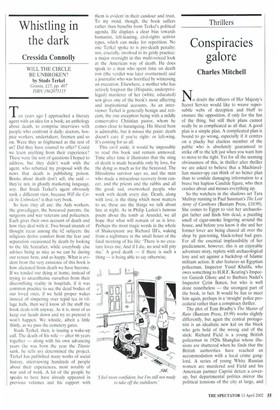Whistling in the dark
Cressida Connolly
WILL THE CIRCLE BE UNBROKEN? by Studs Terkel Granta, £15, pp. 407 ISBN 1862075115 Ten years ago I approached a literary agent with an idea for a book; an anthology about death, to comprise interviews with people who confront it daily: doctors, hospice workers, undertakers, firemen and so on. Were they as frightened as the rest of us? Did they have counsel to offer? Could we learn anything from their experience? These were the sort of questions I hoped to address, but they didn't wash with the agent, who rebutted my proposal with the news that death is publishing poison. Books about death don't sell, she said — they're not, in ghastly marketing language, sexy. But Studs Terkel's agent obviously took a different view, because Will the Circle be Unbroken? is that very book.
So here they all are: the Aids workers, the gravedigger, the bereaved parents, the surgeons and war veterans and policemen. Each gives their own account of death and how they deal with it. Two broad strands of thought recur among the 62 subjects: the religious derive comfort from the fear and separation occasioned by death by looking to the life hereafter, while everybody else advises being as nice as we can be during our tenure here, and as happy. What is evident from the very existence of this book is how alienated from death we have become. If we tended our dying at home, instead of trying to anaesthetise ourselves from their discomfiting reality in hospitals, if it was common practice to see the dead bodies of our loved ones, if we held proper wakes instead of simpering over tepid tea in village halls, then we'd know all the stuff the book deals with anyway. As it is, most of us keep our heads down and try to pretend it won't happen. We whistle, albeit a little thinly, as we pass the cemetery gates.
Studs Terkel, then, is issuing a wake-up call. The death of his wife — after 66 years together along with his own advancing years (he was born the year the Titanic sank, he tells us) determined the project. Terkel has published many works of social history, interviewing hundreds of people about their experiences, most notably of war and of work. A lot of the people he speaks to here have already appeared in previous volumes and his rapport with them is evident in their candour and trust. To my mind, though, the book suffers rather than benefits from Terkel's political agenda. He displays a clear bias towards humanist, left-leaning, civil-rights activist types, which can make for repetition. No one Terkel spoke to is pro-death penalty; nor, crucially, involved in its grisly practice: a major oversight in this multi-voiced look at the American way of death. He does speak to a man who spent time on death row (the verdict was later overturned) and a journalist who was horrified by witnessing an execution. Elsewhere, a mother who has actively forgiven the (Hispanic, underprivileged) murderer of her (white, educated) son gives one of the book's most affecting and inspirational accounts. As an interviewer Terkel is generally benign and reticent, the one exception being with a mildly conservative Christian pastor, whom he comes close to haranguing. His liberal bent is admirable, but it misses the point: death doesn't care if you're rightor left-wing. It's coming for us all.
This cavil aside, it would be impossible to read this book and remain unmoved. Time after time it illustrates that the sting of death is made bearable only by love, for the dying as much as for the bereaved. The Hiroshima survivor says so, and the man who made a miraculous recovery from cancer, and the priests and the rabbis and all the good, sad, overworked people who work with death every day. Death, along with love, is the thing which most matters to us; these are the things we talk about late at night. As in Philip Larkin's famous poem about the tomb at Arundel, we all hope that what will remain of us is love. Perhaps the most tragic words in the whole of Shakespeare are Richard III's, waking from a nightmare in the small hours of the final morning of his life: `There is no creature loves me; And if I die, no soul will pity me.' A good death — if there is such a thing — is being able to say otherwise.


















































































 Previous page
Previous page